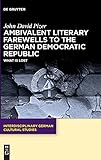Ambivalent Literary Farewells to the German Democratic Republic : What is Lost / John David Pizer.
Material type: TextSeries: Interdisciplinary German Cultural Studies ; 30Publisher: Berlin ; Boston : De Gruyter, [2021]Copyright date: ©2021Description: 1 online resource (VIII, 199 p.)Content type:
TextSeries: Interdisciplinary German Cultural Studies ; 30Publisher: Berlin ; Boston : De Gruyter, [2021]Copyright date: ©2021Description: 1 online resource (VIII, 199 p.)Content type: - 9783110724080
- 9783110725100
- 9783110725032
- 830.9358430878 23
- PT405 .P59 2021.
- online - DeGruyter
- Issued also in print.
| Item type | Current library | Call number | URL | Status | Notes | Barcode | |
|---|---|---|---|---|---|---|---|
 eBook
eBook
|
Biblioteca "Angelicum" Pont. Univ. S.Tommaso d'Aquino Nuvola online | online - DeGruyter (Browse shelf(Opens below)) | Online access | Not for loan (Accesso limitato) | Accesso per gli utenti autorizzati / Access for authorized users | (dgr)9783110725032 |
Frontmatter -- Contents -- Acknowledgements -- A Note on Translations -- Introduction -- Chapter 1 Literary Resistance to Reunification Perceived as Colonization in Novels by Günter Grass, Christa Wolf, and Volker Braun -- Chapter 2 Europe in East Berlin: Emine Sevgi Özdamar’s Ostalgic Constructions -- Chapter 3 Non-Simultaneity and its Corrective: Thomas Brussig’s Ambivalent Engagement with Reunification -- Chapter 4 Performing Reunification as Tragicomedy: Ingo Schulze -- Chapter 5 Time out of Joint in Uwe Tellkamp’s The Towe -- Coda: Contra Grass: The Embrace of Reunification by Martin Walser, Monika Maron, and Fritz Rudolf Fries as well as the Beginning of the End of Autobiographical Literary Farewells to the GDR -- Bibliography -- Index
restricted access online access with authorization star
http://purl.org/coar/access_right/c_16ec
This study reverses the question implicit in title of Christa Wolf’s now-canonical 1990 novella Was bleibt (What remains), looking instead at what was lost during the process of German reunification. It argues that, in their work during and after the Wende, most literary authors from both East and West Germany responded ambivalently to the reunification. Many felt, on the one hand, a keen sense of loss as the GDR dissolved and an expanded Federal Republic summarily absorbed former Eastern Germany. They mourned the ideals of democratic socialism, tolerance, and internationalism that the GDR had held dear, as well as the country’s rich cultural life. On the other hand, however, they recognized that the GDR was a fundamentally corrupt surveillance state whose industry weighed heavily on the environment while failing to buoy the country’s economy. By looking at works by some of the most important authors from either side of the border, this study shows that those who unequivocally embraced the reunification were clearly in the minority.
Issued also in print.
Mode of access: Internet via World Wide Web.
In English.
Description based on online resource; title from PDF title page (publisher's Web site, viewed 25. Jun 2024)


